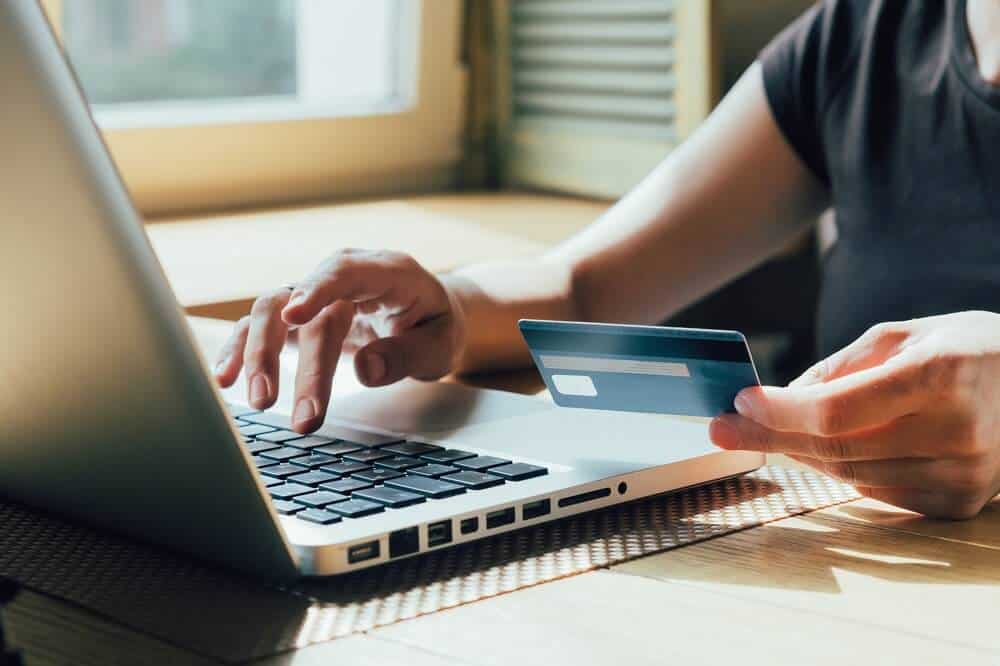An unsecured credit card is a great way to build your credit, minding you can manage to have plastic in your wallet. They do not require collateral in the form of a security deposit and come available for people of all credit scores. Several types of unsecured credit cards exist, such as those with no annual fee, a cashback rewards program, a high credit limit, a travel rewards program, balance transfer capability, and much more.
Many of the best unsecured credit cards have no annual fee or generous rewards programs and benefits. Though, as your credit score falls lower on the scale, you might encounter an annual fee if you’d still like to obtain an unsecured card.
To learn more about these types of credit cards, we’ll discuss everything you need to know about unsecured credit cards.
Featured Financial Products
Table of Contents
What is an Unsecured Credit Card?

An unsecured credit card operates under a different model than a secured credit card. Unsecured cards, the most common credit card type, often represent what people want when applying for a new credit card. Unsecured credit card options rely on expenses hitting a line of credit extended to you in advance.
“Unsecured” means that your debt incurred on the unsecured card doesn’t come backed by collateral—a deposit in the case of secured cards—and relies on a borrower’s credit score. That means this type of card has a higher risk to lenders because they rely on your credit history and your ability to repay.
Because you make charges against a line of credit on an unsecured card, they often get referred to as “charge cards.” However, an unsecured credit card, like a secured credit card, still limits how much you can spend through credit card limits. They also tend to offer users a cashback or rewards program to entice them to open a credit card account.
Related: What is Credit Card Piggybacking & Does It Help Credit Scores?
How Do Unsecured Credit Cards Work?

Unsecured credit cards represent a standard financial product available through banks, credit unions and other service providers. They work by providing you with a revolving line of credit, meaning you can spend up to an approved amount without making a payment within a monthly billing cycle.
You can pay off the card in full each monthly billing cycle, or you can revolve it to the next month and incur interest on any unpaid balance. You can make the minimum monthly payment or choose another amount between this and the entire amount due.
Because credit cards carry some of the highest interest rates of any form of credit available, paying off your balance each monthly billing cycle can save you significant amounts of money over time. Plus, it instills a habit of building a good payment history and, eventually, a good credit score.
Because of the ubiquity of these cards, establishing good money habits pays off significantly through avoided interest expense. You don’t need to look too far to find a credit card through any company remotely related to finance.
Because of this, getting an unsecured card requires you to apply with the financial institution by supplying your personal information and often consenting to a pull on your credit score from the major credit bureaus. Not all card companies require this, but many do. If the company approves your application, they will provide you with an unsecured credit card to use in various locations, both online and off.
Related: Best Credit Cards for Kids: Building Credit & Money Habits Early
What Does it Mean if a Card is Unsecured?

Unsecured credit cards don’t require a security deposit or other collateral. Unless somebody mentions a credit card, it’s safe to assume it’s an unsecured credit card unless they state otherwise. The credit card company trusts you will pay your bills as they rely on your creditworthiness, not a form of collateral they can seize.
If you don’t pay at least your minimum each month, the credit agency reports your delinquent balance to credit bureaus. Frequently missed payments may involve a third-party debt collector. To qualify for an unsecured credit card, you usually need a credit history and at least a fair credit score, although there are exceptions.
Related: Best Credit Cards for Teenagers
What is a Secured Credit Card?

A secured credit card is a type of credit card that requires you to put down an upfront cash deposit, usually equaling the amount of your credit limit. This cash security deposit helps protect the credit card company from recognizing a loss by issuing you a credit card and failing to receive payments.
Secured cards typically work best for individuals with no credit or looking to rebuild bad credit. The cash deposit establishes collateral the credit card issuer may claim in the event of default or failure to make on-time payments.
Featured Financial Products
What is the Difference Between a Secured and an Unsecured Credit Card?

Spending is the same with a secured and an unsecured credit card. You can make purchases in-person or online, and you receive a bill for your purchases each month. Not paying either type of card’s bill in full means you have to pay interest. However, there are several differences between these cards. Unlike unsecured credit cards, a secured card requires a security deposit.
If you don’t pay your monthly statements, the credit card company uses the deposit to cover your expenses. Secured credit cards users typically have little to no credit history or have poor credit. In contrast, unsecured credit card users usually have a credit history and at least fair credit.
Alternatively, some people with unsecured credit cards don’t have established credit but have a cosigner. Unsecured credit cards tend to have fewer fees, lower interest rates, and higher credit limits than secured credit cards. Many also offer rewards, such as travel discounts or cashback.
Finally, unsecured credit card issuers always send credit reports to at least one of the major credit bureaus (Experian, Equifax, and TransUnion), while not all secured credit card issuers do the same. If you can get approved for an unsecured card, that is the preferred option.
Related: Secured Credit Card vs. Unsecured: What’s the Difference?
Is It Good to Have an Unsecured Credit Card?

There are several benefits to having an unsecured credit card. Some people fear credit cards of any kind because they worry about credit card debt. However, if you use it responsibly, having an unsecured credit card is a smart financial move.
Using any type of credit card helps you establish credit. Your credit history and score can later help you secure a mortgage, get better insurance rates, and more. Unsecured cards are convenient, help you track your spending, and are safer than debit cards in fraud protection. They are also great for emergencies.
The best unsecured credit cards have sign-on bonuses and allow you to earn rewards. Overall, it’s a good idea to have one or more unsecured credit cards.
What are the Qualifications to Get an Unsecured Credit Card?

Usually, it would help if you had some credit history and a good, or at least fair, credit score to qualify for unsecured credit cards. However, there are some unsecured cards you can get approved for with a lower score or without established credit.
For example, student credit cards are typically unsecured but don’t require a previous credit history. Instead, you either get a cosigner or show proof of income. Income can mean more than employment.
Regular bank deposits from parents or a spouse can count alongside several other types of money received. You can get your own unsecured card starting at age 18, but it becomes easier once you reach age 21.
Your first unsecured credit card might have a low limit and high interest rate, but the limit can often be increased after you’ve made enough timely payments. Once you’ve been responsible with an unsecured credit card, it becomes much easier to get a new unsecured credit card in the future.
You can earn rewards cards that come with advantages like cash back, travel rewards, and other benefits. Eventually, you may qualify for a platinum credit card.
Related: Best Credit Cards for Students with No Credit
Do Unsecured Credit Cards Require a Security Deposit?

Unlike a secured card, an unsecured card doesn’t require a security deposit. Credit card issuers take on more risk with unsecured credit cards, but this is made up for by the requirements for people approved for an unsecured credit line.
People with unsecured cards usually already have at least fair credit and have shown they will pay back their debt. Alternatively, they have a responsible cosigner responsible for each credit card bill, which replaces the need for a security deposit.
What Credit Score Do You Need for an Unsecured Credit Card?

Often, it would help if you had a credit score of at least 550 to 650 to qualify for an unsecured card. To be eligible for the best unsecured credit cards, such as a platinum credit card, you might need your score to be good or excellent, which falls between 670 to 850.
If you aren’t sure of your score, you can get free credit reports from annualcreditreports.com and other services. Fortunately, if you have a low credit score, there are still some unsecured cards you might fit the requirements for, especially if you can get a cosigner.
In the event your score is still too low for an unsecured card, there are several ways you can build up your credit to qualify for one eventually.
Related: How to Get a Credit Card for the First Time [Starter Credit Cards]
Featured Financial Products
Can an Unsecured Credit Card Help You Build Credit?
An unsecured credit card is a great way to build credit. Providing that your credit card issuer regularly sends an accounting of your payment history to the three major credit bureaus, unsecured credit cards will establish your credit history and help you earn a good credit score.
Using one or more unsecured cards is one of the most popular ways to build credit and improve credit scores. Depending on how you use the card, it can positively or negatively affect your credit. To have it positively affect your credit, pay balances on time and keep utilization low.
Note that you frequently need to establish some initial credit in other ways before you qualify for an unsecured card.
Related: How to Build Credit Without a Credit Card
What Other Credit Card Options Exist if You Have Poor Credit or No Credit History?
You can still get a credit card if you have bad credit or no credit history yet. Rebuilding credit isn’t instant, but it’s possible. Everybody has to start somewhere when it comes to establishing credit.
Secured Credit Cards

It’s significantly easier to qualify for a secured credit card than it is for an unsecured card. Since a secured card requires a security deposit, which is usually equal to your credit limit, the card company has nearly no risk.
Providing you are at least 18 years old, have some verified income, and aren’t going through bankruptcy, you’ll likely get approved for a secured card.
Once you have it, it works very similarly to an unsecured card. You make purchases and pay your bill each month. If you don’t pay in full, you have to pay interest.
Your payments don’t come out of your security deposit, and you don’t get the deposit back until you close or convert your account. Your card may come with fees, such as an annual fee or a foreign transaction fee.
These cards also tend to have a low credit limit, often around $200 or just a few hundred dollars higher. The annual percentage rate (APR) is high, meaning it’s vital to pay your balance in full each month.
While secured cards don’t start with the best terms, once your credit report shows you have a pattern of on-time payments and improved credit scores, you can sometimes get your secured card converted to an unsecured card from your issuer. If not, you can get an unsecured card from another issuer, and that will likely come with a higher credit limit and better overall terms.
Related: Best Credit Cards for No Credit History [Starter Credit Cards]
Become an Authorized User

Being an authorized user allows you to use someone else’s credit card in your name if they provide you with a card to do so. However, even if you don’t make any purchases on the card, it still helps you establish credit just by being listed. You also aren’t legally responsible for paying the bill.
Depending on the card company, you can become an authorized user on someone’s account when you’re as young as 13. Parents putting their teenagers as authorized users on their accounts is a simple method to help them start establishing credit and fattening up thin credit files.
Consider asking a parent, guardian, or another adult you trust to add you as an authorized user on one of their cards. Note that if they have bad credit habits, it can negatively affect your credit score. Only become an authorized user on accounts with consistent on-time payments.
Ensure the card issuer reports you as an authorized user to the three credit bureaus that matter most (Equifax, Experian, and TransUnion). If they don’t report it, it won’t show up on your credit report and doesn’t help towards building or rebuilding credit.
The process to add someone as an authorized user is quick and straightforward. It can usually be done online, over the phone, or through an app.
Becoming an authorized user is different than opening a joint credit card. As part of a joint account, you are legally responsible for any debt the account accumulates.
Related: How Parents Can Help Their Children Build Credit
What Are Other Available Card Options?

Besides a typical credit card, there are other options if you’re looking for the convenience of paying for items with a card instead of cash. These cards are missing some of the benefits of credit cards but can still be helpful.
Prepaid Cards

A prepaid card works similarly to a gift card, except you can use it almost anywhere credit or debit cards are accepted. They also have liability and fraud protections similar to debit cards. The card has a fixed balance, which the user can sometimes reload if desired. You don’t need a bank account to use a prepaid card.
Prepaid cards are a popular gift or prize because the receivers can use them to purchase nearly anything. These cards take up less space than cash and can be used for online purchases as well. Often government benefits can be available through prepaid cards.
Unfortunately, some (but not all) cards have fees cut into your balance, such as a monthly fee, foreign transaction fee, ATM fee, or a reloading fee.
The cards themselves have expiration dates, but the funds don’t expire if you get a new card reissued before it expires. There isn’t a credit line for these cards, and the activity isn’t sent to credit reporting agencies.
That means it won’t help people with limited credit histories establish more credit or improve bad credit scores.
Related: Best Prepaid Debit Cards for Teens & Families [Reloadable]
Debit Cards

Debit cards are an easy way to pay for purchases by spending money directly from a checking account.
You can only spend money you have unless your bank allows overdrafts (which tend to result in a fee). Since you are using your own money rather than borrowing money, it’s different than a credit card.
You can use a debit card instead of cash to save space and always have the exact amount for a purchase. You can also take money out of an ATM with your debit card (fees sometimes apply) or get cashback (from your checking account) during a purchase.
Your debit card has a personal identification number (PIN) that you choose. Entering your PIN to make a purchase shows that you are the cardholder rather than someone paying with a stolen card. You can also make online purchases with a debit card.
There is no bill to pay every month since you’ve covered the costs, unlike with credit cards. There is no interest to be paid, and typically, there isn’t an annual fee. While there can be good reasons to use a debit card, these cards often lack many of the benefits you get from using a credit card.
Some options like the Current debit card allow for cashback and other card benefits.
Credit cards provide more protection if your card gets stolen or there are fraudulent charges. As previously mentioned, many credit cards come with rewards, and debit cards often will not save you money on purchases or give you travel or other discounts.
Debit cards don’t affect your credit score because your activity doesn’t get reported to credit bureaus. If you’re working on building credit or improving your credit score, debit cards won’t help.
Related: Is No Credit Better Than Bad Credit?
How Else to Build Credit

If you can’t get approved for a credit card or don’t want one yet, and have nobody trustworthy who can list you as an authorized user, there are more ways to build credit.
Credit Builder Loans
Credit builder loans aren’t as popular as other methods, but they are a valid way to establish credit. To get a credit builder loan, you usually need to show you have enough income to make your payments.
Once you have a loan, a small amount is put into a savings account or CD. You make payments of a fixed amount until the loan is fully paid. You can then access your money, including any interest you have earned. These loans and payments get reported to at least one major credit bureau.
Passbook and CD loans work almost the same, except using a balance you already had in a CD or savings account. Check that your payments will be reported to credit bureaus before getting one of these loans to build credit.
Early Federal Student Loan Payments
If you are one of the nearly 43 million Americans with a federal student loan, your payment history can help you establish credit.
The sooner you start paying, the longer your credit history, which is one of the factors in credit scores.
Remember, credit scoring models pay the most attention to whether or not you consistently make on-time payments. Don’t make student loan payments early if you can’t afford to do so.
People who can afford early payments benefit from both building credit and from paying less overall interest.
Related: 5 Easy Ways to Build Credit as a College Student
Get a Personal or Auto Loan
Need to get a car? Like other types of loans, an auto loan helps show your payment ability and establishes a credit score. You can also look into getting a personal loan to use for any reason (although some reasons are more likely to get approved for loans than others).
You can sometimes get either of these loans without already having credit because they have other requirements. You may have to show your employment history, income or put something of value up as collateral.
If you’re approved for a loan with limited credit, know that it will likely have a high interest rate.
Report Rent Payments
It isn’t standard for rent payments to be reported to credit bureaus. However, if you ask, sometimes your landlord will use a service to report that you pay rent on time every month.
This method doesn’t require you to take on any debt to build credit, but it isn’t an option for all renters.
Likewise, you might consider using a service like Experian Boost to include additional payments you make in your overall credit score. Using this service may help with boosting a credit score before applying for credit.
Related: Banking Apps for Kids and Teens [How Minors Can Bank]




![10 Best Banking Apps for Kids & Teens [Kid + Teen Banking] 34 banking apps for kids and teens](https://youngandtheinvested.com/wp-content/uploads/banking-apps-for-kids-and-teens.jpg)
![8 Best Teen Checking Accounts [Banks for Teens] 35 best teen checking accounts](https://youngandtheinvested.com/wp-content/uploads/best-teen-checking-accounts.jpg)
![11 Best Debit Cards for Kids [2025] 36 best debit cards for kids](https://youngandtheinvested.com/wp-content/uploads/best-debit-cards-for-kids-600x403.jpg)
